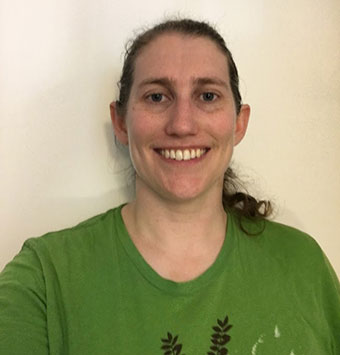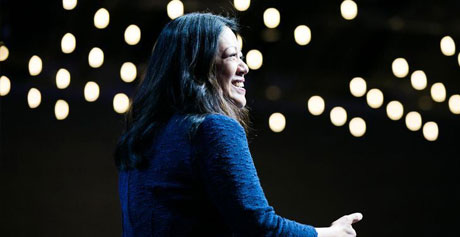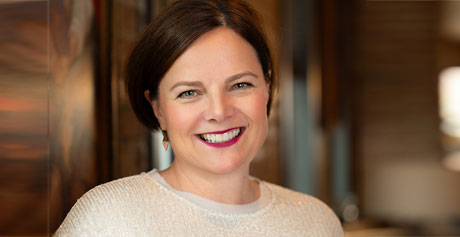An Exclusive Interview with the Association for Women in Science President, Jac Fitzgerald
 Q: For those in our audience not familiar with the Association for Women in Science, can you tell us about the organization and your duties as President?
Q: For those in our audience not familiar with the Association for Women in Science, can you tell us about the organization and your duties as President?
JF: AWIS is a national organization that’s been around for almost 50 years, advocating for equal opportunities and treatment for women in science in the US, across education and industry. What that looks like has changed a lot over time - today we have a business accelerator for women commercializing their work, and we support the ARC network, bringing together researchers for gender equity. But along with this top-down work, we also have chapters in cities and colleges across the country, that provide networking and support to women studying or working in STEM fields. Seattle is one of the larger chapters, not too surprisingly - there’s another chapter in Spokane, and now that everything is happening online, we are hoping to do some joint events.
As president, I think my job is to make sure that we keep thinking about our broader goals, and don’t get caught up in running events or programs just because that’s what we did last year. I don’t have to do any day-to-day organizing, we have a ton of great volunteers organized into a few committees to do that, so I have the space to step back a little and see that there’s another organization doing something similar, maybe we can partner with them, stuff like that. I’m in my last year in the position, my third year, so I want to spend this year making sure we are well set up to continue through the huge changes covid is bringing.
Q: How many members do you currently have in the Seattle Chapter? Have you seen a lot of growth over the years?
JF: I think we have about 40 paying members today, but you don’t need to be a member to participate in any of our activities - membership is a way to support our chapter and the national organization financially, and some people make a donation without joining. So, membership goes up and down based on people’s finances, but all our programs are volunteer-run so they aren’t directly affected by that. Which is good news right now!
Q: Tell us about your education, it looks like you attended universities in France and Australia.
JF: I grew up in Australia, and I have some relatives in France. When I graduated high school, I enrolled in a Software Engineering major, and to continue my French studies I had to enroll in an Arts major as well. I felt that a semester in France would really solidify my language skills, and it did. I studied in Lyon, a city in the south-east near my relatives, and took French classes with French students - the equivalent of doing an English major here. I moved to the US to work for Microsoft when I graduated.
Q: What fascinated you to join AWIS?
JF: It was our kids’ program. Our chapter runs an evening science club for middle school girls in Seattle Public Schools, where adult women who work in various STEM fields teach the girls about a different field each month. It helps them learn about all the different jobs and environments that STEM can lead to, to give them a broader view of the possibilities than the standard scientist in a lab coat - and along with that, it gives them a chance to meet other girls their age who enjoy science and math, and see that a whole range of women work in these jobs, maybe dispel some stereotypes.
Anyway, a friend of mine was one of the volunteers, and she asked me to come along and help with a programming night, and I kept going.
Q: After high school, where did you feel your career path would take you?
JF: I was pretty sure I’d go into software - I started learning to program in high school on my graphics calculator, just out of the manual, and I loved it. I went straight into a Software Engineering program.
Q: What was your first job? And how did it shape or impact you?
JF: My very first job was delivering catalogs, on the weekends at about 12. It paid depending how many different catalogs there were, but the amount of work to be done wasn’t linear - if there was only one catalog I still had to walk the whole route, and once you hit six or so it started to be quicker to fold them into bundles at home before starting the route, but that changed depending on the size of the catalogs. I spent a lot of time trying to analyze the most efficient way to do it, I don’t know if that was where I got the habit or that was just the first time I had a real problem to use it on but I do that for everything still.
Q: What are some of the challenges you feel women face today?
JF: Getting taken seriously as experts, or even as being technical. There’s still a baseline assumption that a woman at a tech event is just there as somebody’s Plus One, or a woman in a meeting is the project manager and not a programmer. A random stranger once tried to explain the nerd joke on my own t-shirt to me - how condescending can you be?
Five Things About Jac Fitzgerald
1. If you could talk to one famous person past or present, who would it be and why?
Someone like Bill Gates, or Warren Buffett - to ask them why they keep all that money. What possible benefit can Gates get out of having 113 billion dollars instead of 100 billion dollars? $13 billion would replace the entire funding shortfall caused by covid - for the WA state government AND for every city in the state. Why hang on to that and watch staff be cut from the foster care system, or cities delay plans to build sidewalks?
2. What were you like as a student?
According to my report cards every year, I had a dry sense of humor. I think that’s still true :)
3. If you were a superhero, what would your special powers be?
Hmm, maybe universal translation. Or the ability to learn new languages instantly? Or just to magically know all languages? I like learning languages, but now I have to think about exactly why I enjoy it!
4. What app can’t you live without?
Libby - the e-book app for the library! I use it even when the libraries are open, it’s amazing to have constant immediate access to a whole library. And I can put books on hold and they’ll just magically appear for me.
5. Do you have any hobbies?
Reading. I lean towards sci-fi and fantasy, but I read almost everything - standard modern literature, historical fiction, detective novels, non-fiction - especially pop psychology and social sciences. I stack up books on my to-read shelf faster than I can get through them. I walk around my neighborhood a lot and there’s a half dozen little libraries and a jigsaw library as well, so I can pass on books I’ve finished with easily

